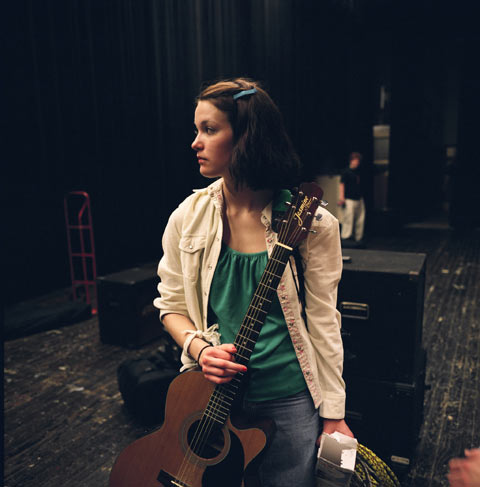
I’m not sure, honestly, what to make of Nanette Burstein’s documentary American Teen, in which she heads out to Warsaw, Indiana, to chronicle a year in the life of seniors at a local high school, which is predominantly white, middle class, and apparently as bland as the day is long. I could complain about Burstein’s decision to concentrate on easy stereotypes, but in context the film’s title actually announces its homogenous intentions. Burstein’s not particularly interested in class, politics, or culture. What she does instead is isolate certain types - the basketball player, the videogame nerd, the popular girl, the artsy outsider — and then try to show the layers of experience that shape their behavior in unexpected ways.
Whether she’s successful in this is
debatable. Megan is cruel, self-centered, and maybe bigoted — but
there’s a tragedy in her family’s past that reveals the pressure
that’s put on her to succeed. Hannah is smart, creative and
rebellious — but when her boyfriend dumps her, she turns into a
pathetic, gibbering wreck and refuses to return to school. And so on.
There is bad behavior, but there are mitigating factors. Rinse, repeat.
The idea is that if you look beyond the stereotype, you’ll find a
complex and surprising individual with her own strengths, shortcomings,
and insecurities.
The problem
is that American Teen
is so aggressively a narrative film that
it feels compromised as documentary. It’s expertly edited, but in a way
that keeps calling attention to the kind of material that
isn’t included. There are jaw-dropping moments, to be sure:
When Megan goes out and spray-paints “FAG” on the
window of another student’s home, you have to wonder at the
exhibitionist tendencies that would allow her to do that on camera, and
it’s certainly interesting to see the non-response response of the
school administrator who actually uses the term “slap on the wrist”
when discussing punishment. (She’s on her way to Notre Dame, see, and
it would be a shame if she earned a bad reputation that screwed that
up.) But what about the kid who earned Megan’s wrath by pushing a
jungle prom theme through student council and relegating Megan’s Asian
design to the dustbin?
And what about the myriad teens who don’t fit Burstein’s thesis
statement?
From self-congratulation and cruelty to self-pity and miserablism, the
film prizes prima donna behavior and, with the exception of the
pointedly acne-ridden Jake, good looks. Occasionally I noticed the
quieter, less-attractive — dare I say heavier? — students who
appeared, briefly, in the margins of the frame, and I wondered what
they had to say. Is everyone in Warsaw hung up on prom and the
impending college years? Is nobody more worried about holding down that
part-time job at the Stop & Save to help make ends meet at home? I kept
thinking of the superior documentary TV series Nimrod Nation, which does have its shortcomings (at times it feels like an slow-motion variant on Friday Night Lights)
but acknowledges the social and political context — anybody’s hometown
has a political dimension if you look for it — that goes unexplored in
Burstein’s film. On the evidence, she figures neither her documentary
subjects nor her audience gives a tinker’s damn about such stuff.
It would be churlish to deny that Burstein gets some of it right. She’s
collected some compelling footage, documenting everything from underage
alcohol consumption to the behavior of the garden-variety nerd on a
date. (Refreshingly, the poor guy comes across as a complete clod —
you feel for him, but no way would you want to go out with him — and
it’s OK, because you can also see him learning from and growing with
the experiences.) I was especially taken, and I’m sure this is by
design, by the story of heartbroken Hannah, the archetypal free spirit
who just wants to get the hell out of this Middle America where she
dwells not by choice but by birth. (As Lou Reed once sang/spoke,
“There’s only one good use for a small town: You hate it, and you know
you’ll have to leave.”) But too much of the behavior Burstein collects
and displays is not just one-dimensional but also unpleasant. I felt
really bad for the poor girl who gets hung out to dry after a topless
photo she sent to two friends makes its way around the entire school,
drawing jibes that are as crude and hurtful as they are frankly
puritanical in origin. Burstein fuzzes out the tits, yes, but in giving
those remarks this kind of platform — even if you believe the film is
critical of them, it essentially amplifies them and archives them for
posterity — I have to wonder whether her film is doing more harm than
good. Kids are mean, sure. But sometimes this movie feels a little too much like being in high school again. C+
